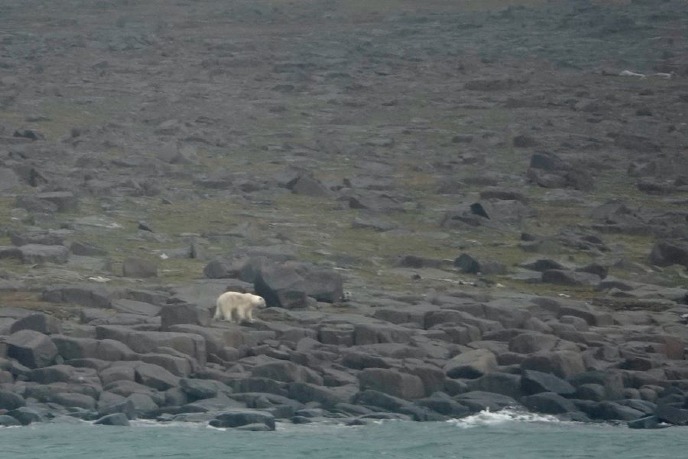Op expeditie, ijsbeer en weder dienende
Met een ‘coronavertraging’ van twee jaar is Maarten Loonen van het Arctisch Centrum van de RUG dit jaar opnieuw naar Spitsbergen vertrokken voor een tweede, grootse ‘SEES-expeditie’. Vijftig onderzoekers en evenzoveel ‘burger-wetenschapers’ ondervinden daar aan den lijve wat de klimaatverandering met het Arctisch gebied doet.
Tekst en foto's: Rob Buiter
“Het gaat echt niet. Uitgesloten.” De mededeling van expeditieleider Jan Belgers is even helder als teleurstellend. Het expeditieschip Ortelius van Oceanwide Expeditions ligt een paar honderd meter voor de kust van het eiland Edgeøya, aan de oostkant van de Spitsbergen archipel. Door de verrekijker zien we een dikke branding. “Het is onverantwoord om door zo’n branding aan land te gaan met de zodiac’s”, bezweert Belgers. En of dat nog niet genoeg is, liggen er ook nog twee vaalwitte vlekjes tegen de rotshelling. Een ijsbeer met een opgeschoten puberjong. “Die ijsberen leven hier. Wij zijn slechts op bezoek. En we willen niet bewust het risico nemen dat we die beer moeten verjagen omdat hij te dicht bij onze groep komt. Of erger. We kunnen dus niet aan land”, vertelt Belgers over de intercom van het schip.
Meer ijsberen, minder zee-ijs
“Dit is dus wat de klimaatverandering doet”, zegt Loonen enigszins berustend. “Tijdens de vorige SEES-expeditie, de Scientfic Ecological Expedition Svalbard, in augustus 2015, hadden we op deze zelfde plek nog moeite om aan land te komen met de rubberbootjes, door al het zee-ijs. Nu is er, zelfs een maand vroeger in het jaar, rond heel Spitsbergen geen zee-ijs meer te vinden. Dat betekent ook dat de golven veel minder worden gedempt en er dus een veel heftiger branding kan staan.”
Ook het aantal ijsberen op de eilanden is hoger dan normaal. “IJsberen jagen en leven het liefst op het ijs. Maar door het snelle smelten zitten ze als het ware gevangen op de eilandjes. Zij kunnen er niet af en wij kunnen er niet op.”

Gletsjer-excursie
Los van de organisatie van deze grootse poolexpeditie, wil Loonen zelf verschillende dingen doen op en rond het eiland Edgeøya. “Met een aantal collega’s willen we onder andere terug naar het gebied Rosenbergdalen”, vertelt hij. “Daar hebben ook de eerste wetenschappers die hier ooit onderzoek deden, gewerkt. Van die vier Nederlandse onderzoekers is Ko de Korte, 79 jaar oud, nu ook weer mee. In 1977 hebben zij, en in 2015 hebben wij daar de vegetatie nauwkeurig in kaart gebracht. Dat willen we nu herhalen om de eventuele veranderingen te zien. Maar ja, dan moeten het weer en de ijsberen wel meezitten.”
Later in de week zullen de expeditieleiders opnieuw kijken of de condities aan de monding van het Rosenbergdal goed genoeg zijn om veilig aan land te gaan. Voor deze dag wordt Plan B in stelling gebracht: een bezoek per zodiac aan de monding van de indrukwekkende gletsjer Negribreen. De enorme afbrokkelende ijsbergen en -bergjes, die van de schuivende gletsjer in zee vallen, compenseren het gebrek aan zee-ijs een beetje. De bezoekers krijgen alsnog een ‘Arctisch gevoel’ te midden van een razendsnel opwarmend en veranderend landschap.
